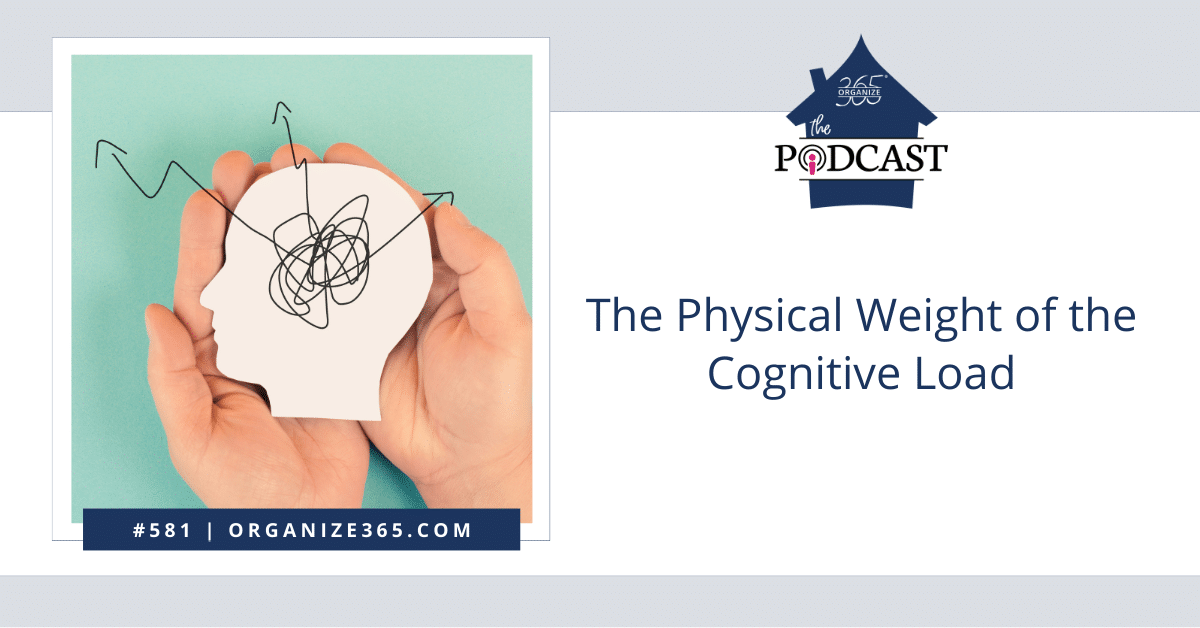
I have these big ideas, big questions, big observations that I think about when I’m driving, going to bed, in the shower…how different related concepts are viewed in different environments and how they actually are all talking about the same thing; we’re just using different words to describe them. So in this episode and the next, I want you to give me a little bit of latitude to verbally process with you where I am thinking we are in our understanding of how we’re functioning inside of our families, especially as the head of household and the administration of what’s going on at home. In this episode I want to really talk about the weight of the mental load inside households. I’m going to hit this from a couple different angles. I’m going to talk about what I’ve been learning about in my PhD, different things I’ve been reading, different things I’ve observed. I’m going to start by talking about cognitive load.
In cognitive psychology, cognitive load refers to the amount of working memory resources used. Heavy cognitive load can have negative effects on task completion, and it is important to note that the experience of cognitive load is not the same in everyone. There is not a lot of literature I have found related to how all of these cognitive processes that we talk about in school or work affect us at home (please send me any links you have!). Working memory remembers tasks, processes information, creates a plan, and makes decisions. We do that at home from the time we open our eyes in the morning until the time we close them for a nap or to go to bed. Even when we go to bed, we’re still trying to remember things, process information, make a plan and make decisions for the next day.
The cognitive load at home is discussed in academia in relation to housework, especially the fact that women are doing more. It doesn’t matter what gender or ethnicity you look at, women are definitely doing more. When I think about our role at home as household managers and the cognitive role at home, there’s no end to our day. There’s no quitting time. There’s no ending time. Then you layer on top of that the fact there are just a bazillion trillion, little teeny tiny tasks that you have to do at home. And here’s the thing: they are all INVISIBLE. I think the fact that the work is invisible adds to the cognitive load in a couple of ways. One, because we gaslight ourselves into thinking maybe we’re not doing as much as we’re actually doing because we can’t see what we actually did. And two is that you know no one else can really see what we’re doing and therefore we don’t get the “atta boys” and gold stars and “thank you very much” that you would normally get if you were in corporate America or in school.
I’m starting to double down on the fact that the uniqueness of the Sunday Basket® and why I think it works so well is the fact that you write things down on paper. I designed it to literally work for any kind of learner. My hypothesis is that it is the recorded thought on paper that is the science part. It gets the thought out of your head – it moves it from working memory and externalizes it. Also the fact that it is written by your hand is key – when you write by hand, the information gets encoded deeper into your brain. So is it the fact that you write that note on paper versus typing it into a phone helping you to retrieve a memory? I am retrieving a memory and writing it down, the physical act of writing is encoding it deeper into my memory. It pulls it out of my working memory onto the paper and then allows it to leave my working memory so now that is clear and ready for whatever I want to think about next. That idea or thing I needed to remember then becomes triage for later urgency, I no longer have to think or remember whatever that was. So then, does this repeated interaction with this task that needs to be done deepen the memory trace of this experience and the recall?
Welcome to the Sunday Basket® – the physical representation of over 10,000 women’s cognitive loads! The actual physical weight of the cognitive load of household management. For funsies, those of you who have a Sunday Basket® – I would love for you to go and weigh your Sunday Basket®. You are holding a very heavy cognitive load comprised of your finances, meal planning, bills that need to be paid, the mail, cleaning schedule, projects that are in process, requests of your time, so many little pieces of information that are literally weighing you down.
I’m here to say, “atta boy”, you’re doing a great job. Here’s your gold star. Thank you so much. Thank you for taking care of your family and your community and your household. Thank you for being financially responsible and cleaning up your messes and making your bed and doing your laundry. The invisible work that you’re doing IS HAPPENING. Hopefully somehow through collaboration, we will be able to scientifically support what is actually happening cognitively for the homeowner in all of the roles and responsibilities that they are doing that are invisible to themselves and those they live with, making it visible so we can have a conversation, so we can eliminate as much as possible so you can do what you were uniquely created to do with your time, which is not more dishes and laundry.
EPISODE RESOURCES:
- The Kitchen Productivity & Profitability Blitz
- Jump Start – Personal
- Jump Start – Kitchen
- The Sunday Basket®
- Sign Up for the Organize 365® Newsletter
Did you enjoy this episode? Please leave a rating and review in your favorite podcast app. Share this episode with a friend and be sure to tag Organize 365® when you share on social media!




